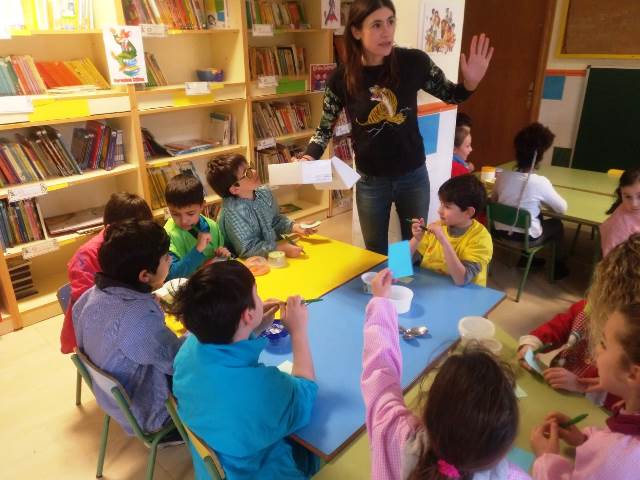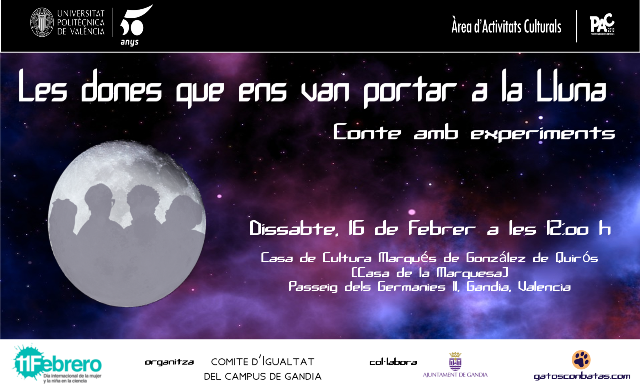More than 1,000 girls and boys from the wider community of the Campus Gandia of the Universitat Politècnica de València (UPV) benefit from the initiative “Bring a Female Scientist to School“, promoted by the Equality Commission of the Campus Gandia UPV, on the occasion of the International Day of Women and Girls in Science.This anniversary is commemorated throughout the world on February 11th, under a United Nations declaration.
Under this initiative, students and staff from the Campus Gandia will give talks and workshops in primary and secondary schools, where they will bring science closer to children and teenagers in an entertaining way. Mathematics used for drawing, programming with Arduino, non-Newtonian fluids, acoustic pollution or marine biodiversity… these are some of the topics that will be covered.

Oliva, Xeresa, Tavernes de la Valldigna, Castelló de Rugat, L’Alqueria de la Comtessa, Rótova… are some of the locations where the workshops will be held in the month of February and starting on Monday 11th.
In addition, on Saturday, February 16th at 12.00 pm in the Gandia Casa de Cultura, the Campus Gandia Equality Commission is set to organize a free activity for families: a dramatized story followed by experiments, entitled “The Women Who Sent Us to the Moon”. The activity is funded by the Cultural Actions Program of the UPV, with the support of the Local Council of Gandia. The aim is to demonstrate that professions in the scientific, mathematical, technological and engineering fields are for both girls and boys.

“Starting with the story of the space scientist, Mónica Grady, we share the feats of other super heroines, people who were, are and will be capable of great achievements in very hostile circumstances. They all used mathematics as a super power and took on great unsolved problems with bravery and cunning”, according to the theater company “Los Gatos Con Batas” (Cats in Lab Coats) , producers of the show.
WITHOUT BARRIERS
With these actions, the Campus adheres to the 11F national initiative that involves women and men who work in research, teaching and scientific communication in different institutions. “The reason is that, at present, women and girls find all kinds of barriers, sometimes quite subtle ones, that make their presence in science difficult,” they explain in the official initiative website, 11defebrero.org. This inequality is evident in the fields of studies chosen by girls and it becomes more acute as they advance in their scientific and technological careers.
PIQUING AN INTEREST IN SCIENCE
The activities promoted by Campus Gandia are aimed at highlighting figures and reinforcing the views in girls and boys that careers in science, mathematics, technology and engineering are made for both girls and boys. In addition, we want to do away with the fear of science and technology, since we believe that science and technology are the key to many of humanity’s present and future problems.
“We believe that fostering an interest in science and technology is necessary for a variety of reasons: because science and technology have ethical, social and economic repercussions which must be known in order to participate actively in decisions as a person and as a society; because practically all the jobs of the future will have technological implications and because having women integrated in scientific and technological teams gives rise to more complete solutions that satisfy society as a whole,” states the Campus Equality Commission.
AGENDA AND DESCRIPTION OF ACTIVITIES
February 11th
“What would you want to be if you were a boy? And a girl? Let’s talk about non-Newtonian fluids: the science behind flubber (slime)” – Isabel Pérez Arjona (Campus Researcher) – 120 children – CRA Alfahuir-Rótova.
“Why do we need an International Day of Women and Girls in Science?” – Josepa Costa (Senior Technician at the Campus); “Let’s get to know the cetaceans” – Blanca Feliu Tena (Researcher, BA in Environmental Sciences, MA in Marine Sciences at the Campus) – 80 children from year 4 of ESO at the IES Ausiàs March in Gandia.
February 12th
“Using Mathematics to draw” – Anna Vidal (Campus Researcher) and Bárbara Gil Altur (Student of Telecommunications, Sound and Image Engineering at the Campus) – 60 children from the 6h grade at the CEIP Alfàndec (Tavernes de la Valldigna).
February 13th
“What research is being conducted at Gandia Campus? The “humanities” are also science!” – Eva Mestre (Campus Researcher); “Let’s get to know the cetaceans” – Blanca Feliu Tena (Researcher, BA in Environmental Sciences, MA in Marine Sciences at the Campus) – 50 children from year 1 of ESO at the IES Gabriel Ciscar de Oliva. We will then repeat the activity for 50 children from the 6th grade at Colegio Hort de Palau in Oliva.
February 14th
What research is being conducted at Gandia Campus? The “humanities” are also science!” – Eva Mestre (Campus Researcher); “Let’s get to know the cetaceans”– Blanca Feliu Tena (Researcher, BA in Environmental Sciences, MA in Marine Sciences at the Campus) – 75 children from the 5th grade at Colegio Hort de Palau de Oliva. Then the activity will be repeated for 50 children from year 1 of ESO at the IES Gabriel Ciscar in Oliva.
“Programming cyber-flowers in Arduino Blocks for the Safor Cyber-Garden” – Mª José Canet (Campus Researcher) – 60 children from CEIP San Antonio de Padua (Xeresa).
“Tell me a story – Xirivella Storytelling Club, presents the storyteller in the workshop Falling in Love with the Universe” – Pilar Sánchez (Senior Officer at the Campus) – Public library of Xirivella – thirty 4-year old children.
“What do you want to be when you grow up?” – Josepa Costa (Senior Officer at the Campus); “Experiments that demonstrate the principles of basic Physics” – Alicia Maqueda; Maria Balagué; Eva Maria Román; Andrea Fernández (Students of the Campus in Telecommunications Engineering and Double Degree in Telecommunications – Audiovisual Communication) – 100 girls and boys from the 3rd and 4th grade at the Colegio Joan Martorell in Gandia.
February 15th
“Why do we need an International Day of Women and Girls in Science?” and “Telecommunications are fun” – Consuelo Part (Campus Researcher) – 60 boys and girls from years 1 and 2 of ESO at the Col.legi Abad Sola in Gandia.
February 18th
“Why do we need an International Day of Women and Girls in Science?” and “Telecommunications are fun” – Consuelo Part (Campus Researcher) – 60 boys and girls from years 3 and 4 of ESO at the Col.legi Abad Sola in Gandia.
“What would you want to be if you were a boy? And a girl? And now … should we make some noise?!” – Romina del Rey (Campus Researcher) – 40 children from the 5th and 6th grade at the Col.legi Public Sant Pere Apòstol in l’Alqueria de la Comtessa.
February 19th
“Why do we need an International Day of Women and Girls in Science?” – Sandra Barrancos (Senior Officer at the Campus); “Let’s get to know the cetaceans” – Blanca Feliu Tena (Researcher, BA in Environmental Sciences, MA in Marine Sciences, and Campus Researcher) – 75 children from 6th grade at the CEIP Roís de Corella in Gandia.
February 21st
“Why do we need an International Day of Women and Girls in Science?” – Isabel Pérez – Arjona (Campus Researcher); “Experimenting with light, forces, electricity” – Alicia Maqueda; Maria Balagué; Eva Maria Román; Andrea Fernández (Students of the Campus in Telecommunications Engineering and the Double Degree in Telecommunications – Audiovisual Communication) – number of students to be determined, Col.legi Castelló de Rugat.
May 23rd
“Sound and noise” – Romina del Rey (Campus Researcher); 100 boys and girls from 1st year of ESO at the IES Gabriel Ciscar in Oliva.

